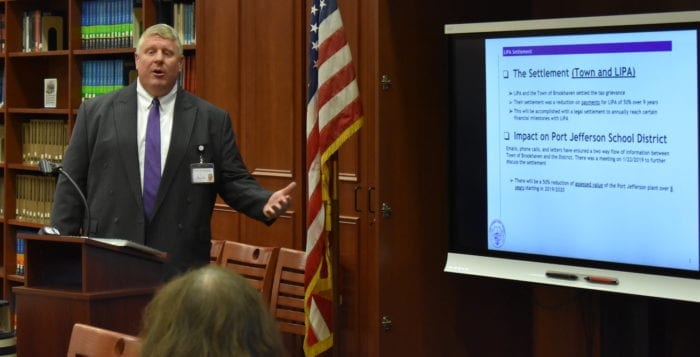While the Port Jefferson School District is preparing its budget for the 2019-20 school year, the shadow of LIPA still hangs over the small school district.
Superintendent Paul Casciano said the LIPA outcome, at least in terms of drafting next year’s budget, was not as bad as it could have been.
“It was translated by the town to be on the assessment rather than our payments,” he said. “With the glide path it gets more challenging later on, but we have time to make adjustments.”
“With the glide path it gets more challenging later on, but we have time to make adjustments.”
— Paul Casciano
In December 2018, the Town of Brookhaven settled with LIPA over the tax assessment of the Port Jefferson power station whose white and red smokestacks can be seen almost anywhere near the harbor. LIPA filed a lawsuit almost a decade ago against both Brookhaven and the Town of Huntington saying its plants in Port Jeff and Northport have been overassessed by millions of dollars and were seeking a 50 percent reduction. The settlement decision agreed to lower LIPA’s assessments by 50 percent over a nine-year period from $32.6 million to $16.8 million starting with the 2017-18 tax year.
Even after the settlement, district officials said the Port Jefferson School District would have the second lowest school tax rates compared to others in Brookhaven Town, only being beaten by Riverhead. The district, going into the ninth year of the settlement, would have a tax rate approximately 100 less than the average of non-Port Jefferson school rates, according to the district.
The school district, along with several village residents, feared what a 50 percent reduction could do to school taxes. Casciano, along with Deputy Superintendent Sean Leister, hosted a special meeting for district residents where they estimated a tax rate of 159 in the 2019-20 school year, and an estimated 243 by the 2026-27 school year.
If local revenues remain flat and with their expected tax levy cap sitting at 1.18 percent, the district expects their current $43.9 million budget will adjust to a $44.1 million rollover budget next school year, an increase of $232,930 if the district maintains all current programming and staff. The current school tax levy — the money a school makes in local area taxes — of $36,434,479 would jump to $37,075,627, more than the schools expected 1.2 percent tax cap.
Leister said this would mean reductions, but the district is currently in the process of creating the upcoming school year’s draft budget.
“We haven’t identified those reductions yet,” Leister said. “We are going to take the next few weeks to see if it can be done through efficiencies: We have to identify what our enrollment looks like, what our student interest looks like and what our scheduling looks like.”
Casciano said this difference is minimal, and it can be made up on the school’s end by tighter budgeting.
“If the community stays in support of the district, it won’t be as dramatic,” the superintendent said. “If the school has to absorb the entire cost of the tax loss, it will be.”
“A cynic would look at it and say you’re just trying to dampen any resistance in the short term and pushing it back.”
— Todd Pittinsky
Before news of the settlement, residents had proposed that the district combine with other area districts, but Leister said that combining with a district like Comsewogue or Mount Sinai would overall increase tax rates. Port Jefferson’s estimated tax rate in the 2019-20 school year is 159 compared to Comsewogue’s 262, assuming an annual levy increase of 2 percent, or under the New York State tax cap.
While the difference is minimal for this school year, the district said the glide path of LIPA’s assessment reduction ramps up over time. While the 2020-21 and 2021-22 school years see a 3.5 percent reduction, later years show reductions going up to 7.5 and 8.25 percent.
Todd Pittinsky, a Port Jeff resident and professor in the Department of Technology and Society at Stony Brook University, said it would behoove the district to think long term when it comes to the reductions over time, and not make those cuts more drastic when the reductions start to increase dramatically.
“A cynic would look at it and say you’re just trying to dampen any resistance in the short term and pushing it back,” Pittinsky said. “I would hope that the effort is one-eighth each year. The formula you are using is going to push back the pain of dislocation or relocation, and it would be very easy to think that other decision makers will be in this role.”






